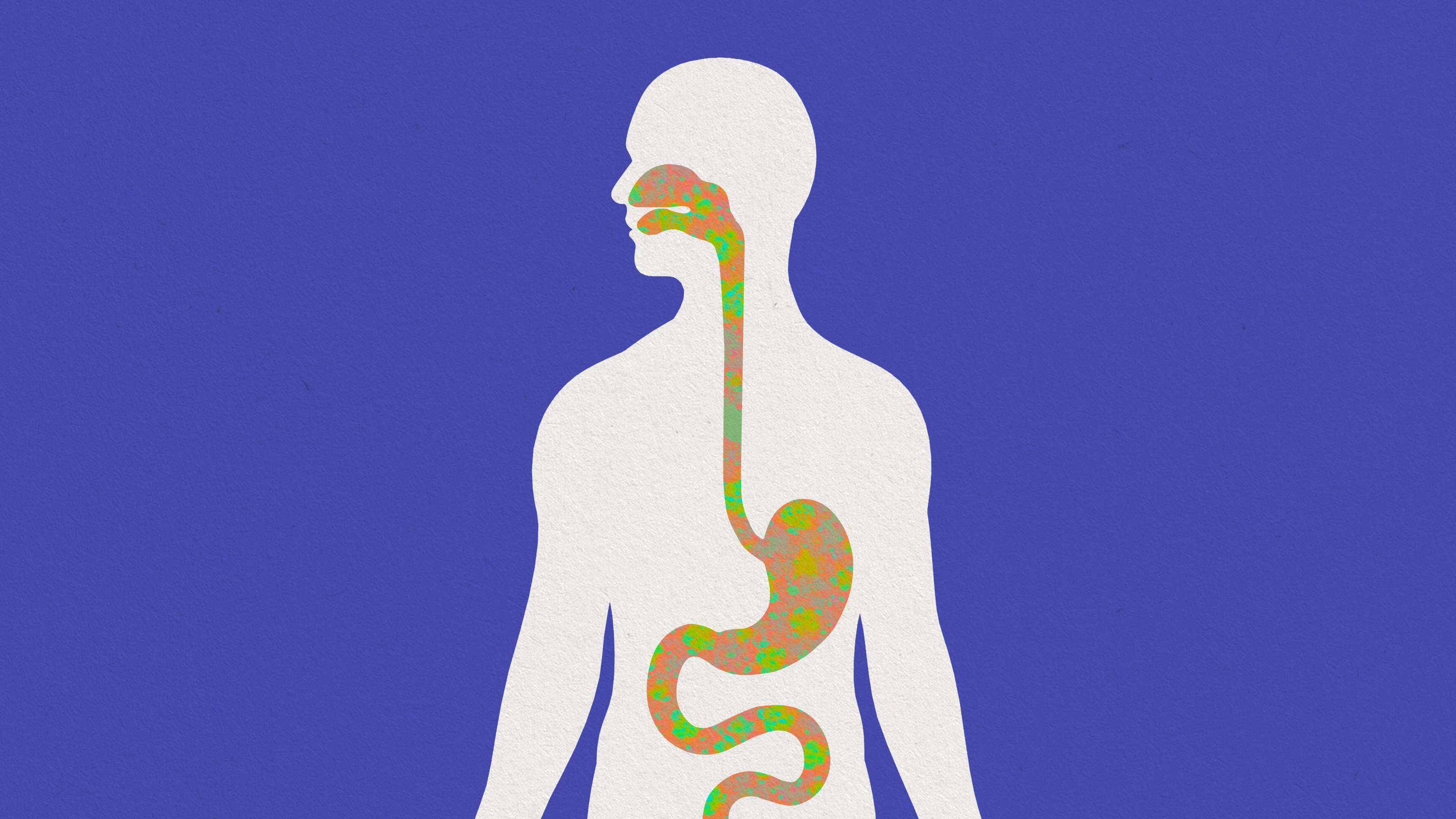The psyche diet: How mental wellness supports lifelong physical health

- Americans say they understand healthy eating and exercise habits yet have difficulty acting upon them.
- Research shows a correlation between health, mental wellness, and longevity—both in the United States and worldwide.
- By seeking ways to improve our mental wellness, we can better sustain healthy eating and exercise routines throughout our lives.
To lose weight, you need to burn more calories than you take in. A sound diet consists of mostly fruits and vegetables, a helping of whole grains, some lean protein, a drizzle of plant oils, and the rare sugar rush. Throw in regular exercise, and you’ve got the makings of a healthier you.
Laid out like that, nutrition and health seem simple enough, and most Americans think so as well. According to a 2016 Pew Research report, 72 percent of U.S. adults agreed that “[e]ven though studies conflict, the core ideas of healthy eating are pretty well understood.” Only a quarter said it was difficult to know how to eat healthily.
Yet, that report stands at odds with the country’s actual habits. CDC data show that only 26 percent of U.S. adults today have a body-mass index in the healthy range—compared to 42 percent in the late ‘80s and early ‘90s. Meanwhile, food myths continue to propagate as fad diets siphon money, time, and resolve from well-intentioned people.
As with any large-scale social problem, there are many variables at play and not all center on personal choice. Social determinants of health, for example, are the often-overlooked consequences of how our society, culture, and environments interact to influence an individual’s health. Pricing can discourage healthy eating if alternatives are significantly cheaper, while food waste squanders resources that could supplement those in need.
But if we zoom further into the realm of the personal, we can find another disregarded factor quietly bending the nutritional calculus into something far more complex than healthy foods plus exercise equals success! And that factor is our mental wellness.
Become the healthiest (minded) you
Consider stress eating. Most people will recognize the comfort a drink or bowl of ice cream brings to the end of a trying day. While not a problem in moderation, when stress becomes ever-present, such a habit can shift from comfort bringer to coping mechanism without a shutoff valve. Under persistent stress, our adrenal glands release cortisol, a hormone that revs up our appetite. If the original stress remains unchecked, the constant push to eat can become a whole new source of stress, compounding the problem. Here, mental wellness impels physical action.
In her Big Think+ expert class, “Become the Healthiest You,” fitness expert Jillian Michaels points to psychological struggles such as stress eating as a major barrier to healthier habits and reaching wellness goals.
“So, if it’s this simple being healthy, why do so many struggle with it?” Michaels said. “That’s because people utilize food for a variety of emotional reasons, whether it’s a coping mechanism, or whether it’s affording them a deeper connection with another individual in their lives.”
This is why effective treatments for stress eating focus on mindset and relationships as much as on steps counted. They can include developing a “readiness for change,” disconnecting from certain environments, positive reinforcement, and social support.
“That is one of the reasons that losing weight or getting healthy is so difficult because it requires us to give up something that has been providing comfort and a defense against hurt for a very long time. It’s not because people are weak or stupid, or lazy, or genetically fat,” Michaels adds.
Straight outta Harvard
The data back Michaels up. One of the best studies showing the interrelation between health, mental wellness, and longevity is the Harvard Study of Adult Development. Beginning in 1937, this longitudinal study followed cohorts of young men, 724 in total, for more than 70 years. It followed up with the men every two years through questionnaires, interviews, and information from their physicians. The goal was to study what choices and social factors supported a healthy life—rather than the traditional approach of the era, which was to focus on sickness.
The results were chronicled across three books written by the principal researcher, George Vaillant, and show a strong association between mental wellness and health in the form of wellness and longevity. (Those looking for rockin’ beach bodies will need to find another study.)
Key factors were education, regular exercise, stable relationships, avoidance of substance abuse, and what the authors called “mature adaptations” (read: emotional intelligence). Men who scored high in these factors were found to be happy and healthy into their 80s. The golden years were also improved significantly by altruism and humor, while depression took a toxic toll.
Warm, supportive relationships also predicted better life outcomes. Marriage correlated with high levels of happiness, while the men who maintained loving relationships with their parents showed lower rates of anxiety and dementia with increased life satisfaction.
Vaillant’s takeaway: “Happiness is love. Full stop.”
Of course, the Harvard Study of Adult Development does have its limitations. Most obviously, its participants were all men. (It was Harvard in the ‘30s, after all.) A fair number of the participants were also well-to-do though the study did include a cohort of inner-city youths from Boston neighborhoods. And by its nature, it was focused solely on U.S. citizens. But even abroad, countries that rank high in health also tend to rank highly in happiness. These salubrious places include Norway, Israel, Iceland, Sweden, Australia, and Switzerland. There are outliers: Spain, Italy, and Japan all rank high in health but much lower in happiness. And one should consider that the metrics being used in these measurements can be a bit WEIRD—that is, they may favor Western, educated, industrialized, rich, and democratic nations. But worldwide, there does seem to be an association between the two.
A mind-body problem
Does health cause people to be happier, are happier people more likely to take up healthy habits, or are they connected in more intricate ways? It’s difficult to determine a causal relationship here, but either way, the point remains the same. That is, the inseparable relationship between physical and mental wellness is sorely missing from our modern concept of diet.
Today, dieters expect to eat like ascetics, exercise like Olympians, and calculate like caloric mathematicians. The process is viewed in mechanical terms of input and output. But you can’t fix your body with the same impartial reasoning that you would a car engine. You are that engine.
Your diet and exercise routines directly affect your decisions, emotions, social connections, and sense of self-worth. The reverse is also true. As such, it’s not a matter of perfection but pleasure. A healthy diet has room for the occasional beer or dollop of ice cream; a thoughtful exercise routine builds in off days. And seeing things as a pursuit of pleasure may make it easier to alter your relationship with the foods and routines that lead to undesirable outcomes. That’s a lifelong pursuit, certainly not one that can burn the fat off in 8 weeks or less (money-back guarantee). It’s also a truer sense of the word diet, which originates from the Greek diaita, meaning “way of life.” In this view, a diet isn’t about losing weight quickly or sculpting muscle fast. It’s about developing a relationship between food and exercise, one that is sustainable and brings you health and happiness throughout your life.
Watch the full class on Big Think+
Our Big Think+ class “Become the Healthiest You” with Jillian Michaels will unlock key lessons for your health and wellness practice, both at work and in your everyday life.
- Why Eating Healthy Can Be So Difficult
- Lay the Groundwork for Success
- Take Small Steps to Conquer Your Goal
- Cross the Finish Line
- Two Simple Ways to Incorporate Wellness into Your Workplace
Learn more about Big Think+ or request a demo for your organization today.





